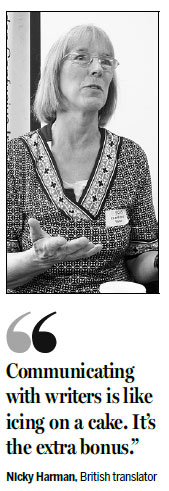

Nicky Harman is still excited while talking about the Chinese literary works she wants to translate, even after nearly 15 years of translating Chinese writing into English.
The British translator is now on a tour of Europe to promote communication between Chinese authors and their Western counterparts, and Han Dong, an avant-garde Chinese poet and novelist from eastern China's Jiangsu province, is also on that tour.
Harman, who started Chinese language studies in 1968, and once taught translation at the Imperial College of London, says she fell in love with Han's writings when she came to China in 2003.
"There are so many Chinese books I intend to translate, ranging from Han Dong to a young woman from Chengdu called Yan Ge, to Xu Xiaobin, a Beijing writer," says the London-based translator.
In 2013, Harman won the first prize in the Chinese-to-English category at the China International Translation Contest, an annual event co-hosted by the State Council Information Office, the Chinese Writers Association and the China Foreign Languages Publishing Administration to promote translated literary works in China.
Talking about distinct styles of writing, she says Yan's works are very different from those by Xu.
Xu is a middle-aged female writer, whose books are intelligent and romantic, while Yan's style is funny, sharp and filled with local dialogues, Harman says.
Yan's writing confused her at times, which proves that differences in family cultures between China and the West can be a tough thing to understand while translating, she adds.
Harman gives the example of Yan's book, Wo Men Jia, or My Family.
In the novel, a bossy 80-year-old woman forbids her children from seeing their lovers and forces them into arranged marriages for money.
"The mother and children were horrible to each other, but in very subtle ways. It's hard to convey (the emotions) in English," she says, adding she asked Yan to ensure that her understanding was accurate.
"If I find particular questions while translating Chinese, I highlight them in the text and ask the authors," she says. "I like to ask them to reply in Chinese, because I think it's clearer (that way), and it's easier for them to use their own language."
When someone responds in a native language, there's always a better chance that what's being said will come out in all its richness, she says.
"Communicating with writers is like icing on a cake. It's the extra bonus, being able to talk to them," she says. "They are the creative people and translating their works is (for me) a process to re-create."
While contacting Chinese writers to clarify nuances, Harman also looks for photos online - the Chinese countryside 30 years ago, as illustrated in some books, for instance.
"In this way, translating takes a lot of time, especially from Chinese to English."
She says it took her a long time to translate Backflow River, a short story by Jia Pingwa, despite the book's length. The translation did, however, win Harman an award in 2003.
Long-term translations can force some good translators take up other projects part time, because they need the money to buy food, pay the rent and raise children, she says.
Harman has translated full time since 2011, after her three children grew up. Her aim is to translate as many Chinese books for Western readers as she can.
caoyin@chinadaily.com.cn
